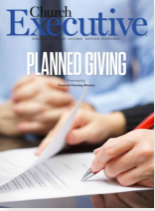
By Michael Prior, J.D.
In our first two installments, this series discussed: So, what exactly is planned giving? and Recognizing planned giving as a ministry.
Now, we’ll examine how a proactive planned giving stewardship program can deliver impressive, real-world results.
Education, documentation, follow-up
Driving great results with any planned giving stewardship program begins with teaching church members why it’s so crucial to have a plan in place that represents their own and their families’ goals. It’s critical that members document important preferences — for emergency medical issues, child guardianship, protections for special needs children, and establishing who has the authority to take control for them in case of incapacity.
“An estate plan written — but never signed or funded — has no effect. The person’s wishes will be ignored and settled by the court. The intended gift to your ministry will not arrive.”
No matter how great or modest our assets might be, we must document the path to pass them on to our loved ones and to charities, to avoid the pitfalls of probate.
Providing this information to church members in a plain-spoken, uncomplicated 90-minute seminar has proven incredibly effective. Members are shown options and resources to complete the necessary documents, including local professionals, form services, or a no-cost, non-profit option available through our own organization, Financial Planning Ministry.
Follow-up is also key. An estate plan written — but never signed or funded — has no effect. The person’s wishes will be ignored and settled by the court. The intended gift to your ministry will not arrive.
As such, an effective planned giving program must include member follow-up, including record of a signing date of the final documents. Again, our organization can guide and secure that.
Real-world results
Our approach to a proactive planned giving stewardship program involves the development of a non-profit partnership of ministries in a shared-cost model, with no cost passed to church members — which church members have, of course, told us they appreciate. Instead, church members are encouraged to include a charitable gift from their final estate distribution to ministries they select.
Here’s a snapshot gathered among five of our church partners: Saddleback Church in Lake Forest, Calif; Southeast Christian Church in Louisville, Ky.; Christ Fellowship Church in West Palm Gardens, Fla.; Central Christian Church in Mesa, Ariz.; and Gateway Church in Southlake, Texas.
Total families participating among these five churches: 3,800
Gift designations with signatures and funding verified: $220 million
Estimated probate costs avoided: $122.5 million
Average gift designation per family: $57,000
Christ Fellowship Church: Our team has completed several seminars at Christ Fellowship. Attendees have absolutely raved about the planned giving stewardship program — as a ministry, with regards to member care and, of course, the results achieved.
Southeast Christian Church: Leaders at Southeast Christian Church tell us that many of their members are benefitting from an invaluable estate planning service. This, they say, is helping these individuals and families leave a legacy that honors God and advances His Kingdom.
Central Christian Church: The planned giving stewardship program at Central Christian Church has been in place for 25 years. Leaders tell us it has been one of the most effective ministries they’ve offered their people, overall.
Getting started with planned giving
As a ministry, planned giving is growing in the consciousness of church leaders, and for good reason. When a pastor realizes the personal importance of these life-planning documents, the future-gift income stream actually becomes a secondary priority.
To get planned giving going at your own church:

1) Determine who on your team will “own” and promote the program.
2) Secure commitment from the leadership team. (Planned giving is a long-term proposition. It needs to be part of the ongoing fabric of your Stewardship – Generosity – Legacy programming.)
3) Commit the necessary budget and promotional assets to achieve long-term success.
4) Lead by example. Put your own estate plan in place. (Here again, our team can do this for you.)
5) Be prepared for your own “Field of Dreams” experience: If you build it, they will come.
Michael Prior, J.D., is president of Irvine, Calif.-based Financial Planning Ministry. FPM was formed 30 years ago as a nonprofit to serve the church and its members with education in an important, but often unrecognized, area of stewardship: biblical estate planning.
FPM offers free, 90-minute seminars hosted by partner church ministries to explain (in plain English) how wills and trusts work; the detrimental effects of probate; and a path / plan forward. To date, the group has served more than 24,000 families; no investments have been sold, and no monies have exchanged hands.
Before joining the organization, Prior served as executive pastor at Central Christian Church in Mesa, Ariz.



